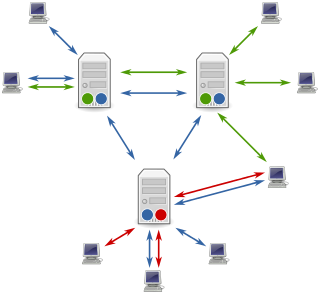
AOL is an American web portal and online service provider based in New York City. It is a brand marketed by the current incarnation of Yahoo Inc.

A bulletin board system or BBS is a computer server running software that allows users to connect to the system using a terminal program. Once logged in, the user can perform functions such as uploading and downloading software and data, reading news and bulletins, and exchanging messages with other users through public message boards and sometimes via direct chatting. In the early 1980s, message networks such as FidoNet were developed to provide services such as NetMail, which is similar to internet-based email.
A Usenet newsgroup is a repository usually within the Usenet system, for messages posted from users in different locations using the Internet. They are discussion groups and are not devoted to publishing news. Newsgroups are technically distinct from, but functionally similar to, discussion forums on the World Wide Web. Newsreader software is used to read the content of newsgroups.

Dial-up Internet access is a form of Internet access that uses the facilities of the public switched telephone network (PSTN) to establish a connection to an Internet service provider (ISP) by dialing a telephone number on a conventional telephone line. Dial-up connections use modems to decode audio signals into data to send to a router or computer, and to encode signals from the latter two devices to send to another modem.
CompuServe was an American online service provider, the first major commercial one in the United States – described in 1994 as "the oldest of the Big Three information services ."
Dynamic DNS (DDNS) is a method of automatically updating a name server in the Domain Name System (DNS), often in real time, with the active DDNS configuration of its configured hostnames, addresses or other information.

An Internet service provider (ISP) is an organization that provides services for accessing, using, or participating in the Internet. ISPs can be organized in various forms, such as commercial, community-owned, non-profit, or otherwise privately owned.

A web hosting service is a type of Internet hosting service that hosts websites for clients, i.e. it offers the facilities required for them to create and maintain a site and makes it accessible on the World Wide Web. Companies providing web hosting services are sometimes called web hosts.
UUCP is an acronym of Unix-to-Unix Copy. The term generally refers to a suite of computer programs and protocols allowing remote execution of commands and transfer of files, email and netnews between computers.
An online service provider (OSP) can, for example, be an Internet service provider, an email provider, a news provider (press), an entertainment provider, a search engine, an e-commerce site, an online banking site, a health site, an official government site, social media, a wiki, or a Usenet newsgroup.

MindVox was an early Internet service provider in New York City. The service was referred to as "the Hells Angels of Cyberspace" — it was founded in 1991 by Bruce Fancher and Patrick Kroupa, two former members of the Legion of Doom hacker group. The system was partially online by March 1992, and open to the public in November of that year.

ClarkNet was an Internet service provider (ISP) located in Ellicott City, Maryland that began operation in April 1993. It was the first ISP local to the Baltimore area and the second ISP native to Maryland. Operations ceased during 2003.

Plusnet plc is a British triple play internet service provider (ISP); providing broadband, landline and mobile services. The company was founded in 1997 in Sheffield, England, and became a public limited company (plc) in July 2004 when it was floated on the Alternative Investment Market. On 30 January 2007, Plusnet was acquired by BT Group, but it continues to operate as a separate business. By December 2013, it had over 750,000 customers across the UK.
WorldWide Access, also known as WWA, was an Internet Service Provider based in Chicago, Illinois. WorldWide Access was the service name of the company, which was called Computing Engineers, Inc.
Panix is the third-oldest ISP in the world after The World and NetCom. Originally running on A/UX on an Apple Macintosh IIfx, Panix has gone through a number of transitions as the Internet has grown. It maintains a vibrant community of shell users and posters to its private panix.* USENET newsgroups.

Usenet is a worldwide distributed discussion system available on computers. It was developed from the general-purpose Unix-to-Unix Copy (UUCP) dial-up network architecture. Tom Truscott and Jim Ellis conceived the idea in 1979, and it was established in 1980. Users read and post messages to one or more topic categories, known as newsgroups. Usenet resembles a bulletin board system (BBS) in many respects and is the precursor to the Internet forums that have become widely used. Discussions are threaded, as with web forums and BBSs, though posts are stored on the server sequentially.
The Internet in Kazakhstan is growing rapidly. Between 2001 and 2005, the number of Internet users increased from 200,000 to 1 million. By 2007, Kazakhstan reported Internet penetration levels of 8.5 percent, rising to 12.4 percent in 2008 and 34.3% in 2010. By 2013, Kazakhstani officials reported Internet penetration levels of 62.2 percent, with about 10 million users. There are five first-tier ISPs with international Internet connections and approximately 100 second-tier ISPs that are purchasing Internet traffic from the first-tier ISPs. As of 2019, more than 75% of Kazakhstan's population have access to the internet, a figure well ahead of any other country in Central Asia.
EarthLink is an American Internet service provider.

MSN Dial-up is an Internet service provider operated by Microsoft in the United States and formerly also in several other countries. Originally named The Microsoft Network, it debuted as a proprietary online service on August 24, 1995, to coincide with the release of Windows 95. In 1996 and 1997, a revised web-based version of the ISP was an early experiment at interactive multimedia content on the Internet.
The commercialization of the Internet refers to the creation and management of online services principally for financial gain. It typically involves the increasing monetization of network services and consumer products mediated through the varied use of Internet technologies. Common forms of Internet commercialization include e-commerce, electronic money, and advanced marketing techniques including personalized and targeted advertising. The effects of the commercialization of the Internet are controversial, with benefits that simplify daily life and repercussions that challenge personal freedoms, including surveillance capitalism and data tracking. This began with the National Science Foundation funding supercomputing center and then universities being able to develop supercomputer sites for research and academic purposes.












